
Kalaburagi, formerly known as Gulbarga, is a city in the Indian state of Karnataka. It is the administrative headquarters of the Kalaburagi district and is the largest city in the region of North Karnataka (Kalyana-Karnataka). Kalaburagi is 568 km north of the state capital city of Bangalore. It was incorporated into the newly formed Mysore State through the States Reorganisation Act in 1956.

Coffee is a beverage brewed from roasted coffee beans. Darkly colored, bitter, and slightly acidic, coffee has a stimulating effect on humans, primarily due to its caffeine content. It has the highest sales in the world market for hot drinks.
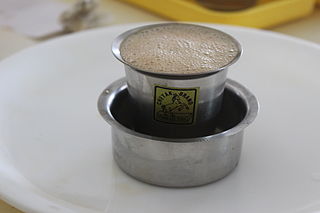
Indian filter coffee is a coffee drink made by mixing hot milk and sugar with the infusion obtained by percolation brewing of finely ground coffee powder with chicory in a traditional Indian filter. It has been described as "hot, strong, sweet and topped with bubbly froth" and is known as filter kaapi in India.

Chikmagalur, officially Chikkamagaluru is an administrative district in the Malnad subregion of Karnataka, India. Coffee was first cultivated in India in Chikmagalur. The hills of Chikmagalur are parts of the Western Ghats and the source of Tunga and Bhadra rivers. Mullayanagiri, the highest peak in Karnataka is located in the district. The area is well known for the Sringeri Mutt that houses the Dakshina Peeta established by Adi Shankaracharya.

Kodachadri is a mountain peak with dense forests in the Western Ghats in South India, 78 km from Shimoga. Kodachadri is the highest peak in Shivamogga district. It is declared as natural heritage site by the Karnataka Government. and it is 13th highest peak of Karnataka.

A caffè mocha, also called mocaccino, is a chocolate-flavoured warm beverage that is a variant of a caffè latte, commonly served in a glass rather than a mug. Other commonly used spellings are mochaccino and also mochachino. The name is derived from the city of Mokha, Yemen, which was one of the centres of early coffee trade. Like latte, the name is commonly shortened to just mocha.
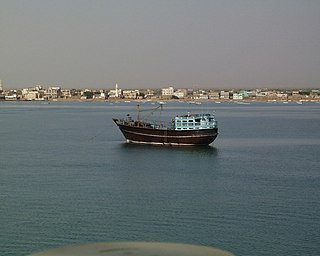
Mokha, also spelled Mocha, or Mukha, is a port city on the Red Sea coast of Yemen. Until Aden and al Hudaydah eclipsed it in the 19th century, Mokha was the principal port for Yemen's capital, Sanaa. Long known for its coffee trade, the city gave its name to Mocha coffee.

Baba Budangiri, also known as Chandradrona, is a hill and mountain range in the Western Ghats of India, located in the Chikkamagaluru district of Karnataka.
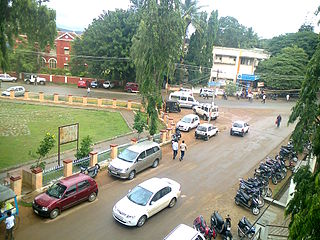
Chikmagalur, known officially as Chikkamagaluru, is a city and the headquarters of Chikmagalur district in the Indian state of Karnataka. Located on the foothills of the Mullayanagiri peak of the Western Ghats, the city attracts tourists from around the world for its pleasant and favourable hill station climate, tropical rainforest and coffee estates. The pristine Baba Budangiri lies to the north of Chikmagalur where it's believed Baba Budan first introduced coffee to India.
Mulabagilu is a town and administrative center of Mulabagilu taluk, in the Kolar district in the state of Karnataka, India. The town is situated on the National Highway 75 and is the easternmost town of the state.
The Mysore plateau, also known as the South Karnataka plateau, is a plateau that is one of the four geographically unique regions of the Indian state of Karnataka. It has many undulations and is bounded on the west and south by the Western Ghats. Most of the river Kaveri flows through Karnataka in the Mysore Plateau. The average elevation in the region is between 600 and 900 meters. The plateau covers the districts of Bangalore, Bangalore Rural, Chamarajanagar, Hassan, Kodagu, Kolar, Mandya, Mysore and Tumkur.
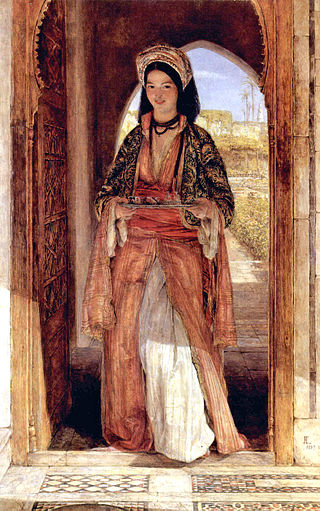
The history of coffee dates back to centuries of old oral tradition in modern-day Somalia, Ethiopia and Yemen. It was already known in Mecca in the 15th century. Also, in the 15th century, Sufi monasteries in Yemen employed coffee as an aid to concentration during prayers. Coffee later spread to the Levant in the early 16th century; it caused some controversy on whether it was halal in Ottoman and Mamluk society. Coffee arrived in Italy the second half of the 16th century through commercial Mediterranean trade routes, while Central and Eastern Europeans learned of coffee from the Ottomans. By the mid 17th century, it had reached India and the East Indies.

Coffee culture is the set of traditions and social behaviors that surround the consumption of coffee, particularly as a social lubricant. The term also refers to the cultural diffusion and adoption of coffee as a widely consumed stimulant. In the late 20th century, espresso became an increasingly dominant drink contributing to coffee culture, particularly in the Western world and other urbanized centers around the globe.
Lingadahalli is a village in Tarikere Taluk, Chikkamagaluru district, Karnataka, India. Lingadahalli is one of the prominent pre-historic sites in Karnataka state.

Coffee production in India is dominated in the hill tracts of South Indian states, with Karnataka accounting for 71%, followed by Kerala with 21% and Tamil Nadu. Indian coffee is said to be the finest coffee grown in the shade rather than direct sunlight anywhere in the world. There are about 250,000 coffee growers in the country; 98% of them are small growers. As of 2009, Indian coffee made up just 4.5% of the global production. Almost 80% of Indian coffee is exported; 70% is bound for Germany, Russia, Spain, Belgium, Slovenia, United States, United Kingdom, Japan, Greece, Netherlands and France. Italy accounts for 29% of the exports. Most of the export is shipped through the Suez Canal.
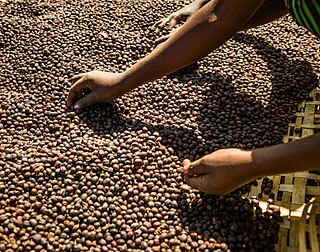
Coffee production in Ethiopia is a longstanding tradition which dates back dozens of centuries. Ethiopia is where Coffea arabica, the coffee plant, originates. The plant is now grown in various parts of the world; Ethiopia itself accounts for around 17% of the global coffee market. Coffee is important to the economy of Ethiopia; around 30-35% of foreign income comes from coffee, with an estimated 15 million of the population relying on some aspect of coffee production for their livelihood. In 2013, coffee exports brought in $300 million, equivalent to 24% of that year's total exports.
Arabs in India are people with Arab origins who have over a long period of time, settled in the Indian subcontinent. There have been extensive trade and cultural links between India and the Arab world spanning several millennia. The west coast region of India, especially Malabar and Konkan coasts were active trading hubs, where Arab merchants frequently used to visit on their way to Sri Lanka and South East Asia. Over a span of several centuries, migrants from different Arabian nations immigrated to various regions and kingdoms of the Indian subcontinent as merchants, missionaries and through intermarriages.
At Turbah is a town near the coast of the Red Sea in Taiz Governorate, Yemen. It lies about 75 km from Taiz and is about 1,800 metres above sea level. Its population in 2004 was 10,505.

The Mocha coffee bean is a variety of coffee bean originally from Yemen. It is harvested from the coffee-plant species Coffea arabica, which is native to Yemen. Mocha coffee beans are very small, hard, have an irregular round shape, and are olive green to pale yellow in color.













